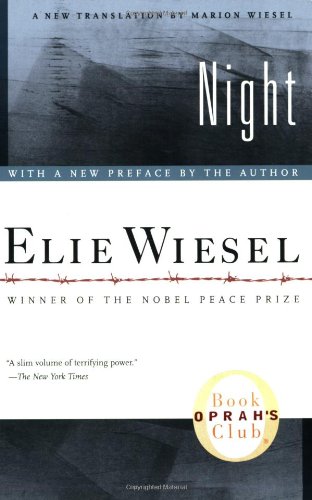All Nonfiction
- Bullying
- Books
- Academic
- Author Interviews
- Celebrity interviews
- College Articles
- College Essays
- Educator of the Year
- Heroes
- Interviews
- Memoir
- Personal Experience
- Sports
- Travel & Culture
All Opinions
- Bullying
- Current Events / Politics
- Discrimination
- Drugs / Alcohol / Smoking
- Entertainment / Celebrities
- Environment
- Love / Relationships
- Movies / Music / TV
- Pop Culture / Trends
- School / College
- Social Issues / Civics
- Spirituality / Religion
- Sports / Hobbies
All Hot Topics
- Bullying
- Community Service
- Environment
- Health
- Letters to the Editor
- Pride & Prejudice
- What Matters
- Back
Summer Guide
- Program Links
- Program Reviews
- Back
College Guide
- College Links
- College Reviews
- College Essays
- College Articles
- Back
Night by Elie Wiesel
Anne Frank once said, “If we bear all this suffering and if there are still Jews left, when it is over, then Jews, instead of being doomed, will be held up as an example.” This means that once the Holocaust is over, the scarce amount of survivors will share their story to help people; that is what Elie Wiesel did. His autobiography Night, written in 1960, is a brilliant smack-in-the-face to reality that depicts his experiences during the Holocaust in 1960. It begins with him and his Jewish family living faithfully in their small town. A few events occurred, like Moishe almost being murdered and the Germans putting them into ghettos, but Elie’s family and the community stayed positive. Then they were proven wrong in the worst way. Like other Jews and gypsies, they were taken to concentration camps. The unsettling story of what happened to this world less than 80 years ago is told here.
This book was difficult to read and hard to deal with the emotions. The average adult would struggle with this book. Elie vehemently filled the 120 pages with a great lesson. In the book, Elie formulated a moral: it’s important to keep hope. From the beginning everyone in the community told themselves that the ghettos were for their own protection. Then, on the filthy cattle cars they said remained positive. Finally, the hope began to falter. People were stripped of their originality and became bodies. With all the pain and their personalities torn from them they had nothing left except to live or die. After a little kid was hanged, people in the book were saying, “For God’s sake, where is God?” The Jewish religion is a very faithful one and to witness them through words lose all hope was depressing. Wiesel wrote the book in the exact way needed for people to understand the situation: there wasn’t a happy ending.
Elie showed how people were treated so poorly. Many were killed right away and others were left to die. Readers might not know how human beings were treated worse than animals. The book shows how the people were put into cattle cars, they were stripped, shaved, and they had their names replaced by numbers. If you have never heard of the holocaust or are okay with wanting to cry, read Night. The book got to the point and it is a quick read that is completely worth it which earns it a 10/10 (no exaggeration). I wish Elie extended this because it was so intriguing and it left me shocked at the inhumanity. Night changed me, but it did so in a life-altering way.
Similar Articles
JOIN THE DISCUSSION
This article has 0 comments.

